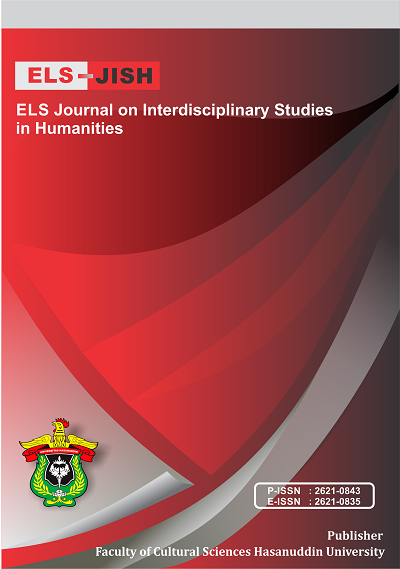The Analysis of Politeness Strategies and Kinship Relationship: A Study Case of Wawonii Educational Background Compared to American
DOI:
https://doi.org/10.34050/elsjish.v6i3.28837Keywords:
Educational background, Kinship, Politeness strategiesAbstract
This research aims (1) to analyze the types of politeness strategies used by Wawonii speakers compared to American in daily conversations, and (2) to explore the educational background defined politeness strategies of Wawoniiese compared to American. The research used the quantitative research method. Wawoniiese data were collected from 32 respondents in North East Wawonii through questionnaire, observation, interview, and recorded dialogue form of speech. American data were taken from transcribed conversations of selected movies. The research result found that Wawoniiese and American speakers used four of the Politeness Strategies by Brown and Levinson. They were Bald-on-record, Positive Politeness, Negative Politeness, and Off-record. Furthermore, this research also found that the politeness systems of young and older people are almost similar, for instance, both systems showed 93,75% of speakers used deferent speech variety when talking to Parents-in-law. Meanwhile, when adding the educational background, the result showed more variations in politeness systems. Despite having age differences the older and younger family members can have conversations in mixed and casual varieties due to the influence of the educational background of speakers. For instance, the politeness systems by well-educated showed 37,5% of speakers used mixed speech variety and 56,25% of speakers used casual speech variety when talking to older cousins. Therefore, in Wawonii notably in North East Wawonii the educational background of speakers is the factor that significantly defines the choice of people's utterances compared to the variable of age. Hence, this research concluded that educational background influenced the politeness strategies of Wawonii speakers but not of American.
References
Brown, P., Levinson, S. C., & Levinson, S. C. (1987). Politeness: Some Universals in Language Usage (Vol. 4). Cambridge university press.
Cruse, A. (2006). Glossary of Semantics and Pragmatics. Edinburgh University Press.
Delima P., Sailan Z., & Yani L. (2019). Maksim Kesantunan Berbahasa Wawonii. Jurnal Bastra (Bahasa Dan Sastra), 4(2).
Evason, N. (2021). Family. Retrieved from https://culturalatlas.sbs.com.au/american-culture/american-culture-family on March 28, 2022.
Evason, N. (2022). Communication. Retrieved from https://culturalatlas.sbs.com.au/american-culture/american-culture-communication on March 28, 2022.
Fatimah, R. (2021). Ideology and Politeness Strategies used by American People and Buginese with Special Reference to Bone. English Language Studies. Hasanuddin Univeristy.
Griffiths, P. (2006). Introduction to English Semantics and Pragmatics. Edinburgh university press.
Lakoff, R. T. (1973). The logic of politeness, or minding your p’s and q’s. Chicago Linguistics Society, 9, 292–305
Lakoff, R. (1977). What you can do with words: Politeness, pragmatics and performatives. In Proceedings of the Texas conference on performatives, presuppositions and implicatures (pp. 79-106). Arlington, Va.: Center for Applied Linguistics.
Leech, G. N. (1983). Principles of Pragmatics. Longman Inc, USA.
Leech, G. N. (2014). The pragmatics of politeness. Oxford Studies in Sociolinguis.
Levinson, S. C. (1983). Pragmatics. Cambridge University Press.
Piercy, F. P., Soekandar, A., Limansubroto, C. D., & Davis, S. D. (2005). Indonesian families. Ethnicity & family therapy (3rd ed., pp. 332–338). London: The Guilford.
Read, D. W. (2018). Kinship System. The International Encyclopedia of Anthropology.
Scollon, R., & Scollon, S. B. (1983). “Face in Interethnic Communication”. Language and Communication. Eds. J. C. Richards and R. W. Schmidt. London: Longman. 156-190.
Scollon, R and S.B.K. Scollon. (1995). Intercultural Communication: A Discourse Approach. Oxford, Cambridge: Blackwell.
Scollon, R., & Scollon, S. W. (2012). Intercultural communication: A discourse approach. John Wiley & Sons.
Watts, R. J. (2003). Politeness. Cambridge University Press.
Winiharti, M., & Salihah, T. S. (2017). How a Betawinese family implement politeness in their daily conversation. Lingua Cultura, 11(2), 91-96.
Yassi, A. H. 1996. Negating and Affirming a Propositon in Makasserese: A Cross-Cultural Communication Study. Australia: Department of Linguistics, The University of Sydney, NSW. (Unplubished Master Research Paper).
Yassi, A. H. (2018). Mapping the Politeness Systems of Heritage Language Culture of South Sulawesi, Indonesia: Ages and Politeness Strategy. Cultural Science Faculty of Hasanuddin University of Makassar, Indonesia.
Yassi, A. H. (2021). Another Prospective Model of Politeness Theoretical Framewrok: Politeness Phenomena of Heritage Language Cultures of South Sulawesi Ethnic Groups, Indonesia. Cultural Science Faculty of Hasanuddin University of Makassar, Indonesia.
Yetty, Y. (2018). Politeness Strategy on Social Interaction Used by Munanese. ELS Journal on Interdisciplinary Studies in Humanities, 1(1), 59-65.
Yule, G. (1996). Pragmatics. Oxford University Press, New York.
Downloads
Published
How to Cite
Issue
Section
License
Copyright (c) 2023 Rizki Ashariah Sarwin, Abdul Hakim Yassi, Sukmawaty

This work is licensed under a Creative Commons Attribution-ShareAlike 4.0 International License.






